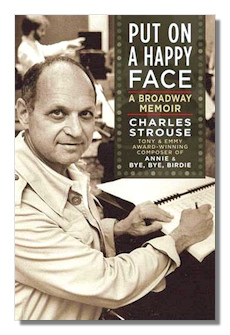
The Internet's Premier Classical Music Source
Related Links
-
Introduction
Acoustics
Ballet
Biographies
Chamber Music
Composers & Composition
Conducting
Criticism & Commentary
Discographies & CD Guides
Fiction
History
Humor
Illustrations & Photos
Instrumental
Lieder
Music Appreciation
Music Education
Music Industry
Music and the Mind
Opera
Orchestration
Reference Works
Scores
Thematic Indices
Theory & Analysis
Vocal Technique
Search Amazon
Recommended Links
Site News
 Book Review
Book Review
Put on a Happy Face

A Broadway Memoir
Charles Strouse
New York: Sterling Publishing. 2008.
ISBN-10: 1402758898
ISBN-13: 978-1402758898
Summary for the Busy Executive: Brrroad-way!
A typical Broadway memoir of an atypical Broadway career, Put on a Happy Face depicts the rise of Charles Strouse, best known for Bye Bye Birdie and Annie. Because my parents loved me, they took me to a performance of the original production of Birdie, so I got to see Dick Van Dyke, Chita Rivera, and a man who became an instant hero, Paul Lynde, purveyor of wickedly funny comic timing before Bewitched sugared him up for TV. At 12, I considered myself a connoisseur of musicals. The opening number, a brilliant contrapuntal swirl of white rock 'n' roll clichés called "The Bell Telephone Hour," announced an evening above the usual.
It turns out that, after a moderately traumatic childhood (read all about it), Strouse studied composition at Eastman and with Aaron Copland, David Diamond, Arthur Berger, and Nadia Boulanger. He left to make his mark in New York and fortunately had the brains to realize it wasn't going to be through his concert music. He knocked about doing everything – audition accompanist for singers and dancers, pop pianist in seedy clubs and strip joints, rehearsal pianist, and, finally, writing for off-Broadway reviews, notably for the legendary eccentric producer Ben Bagley. Beyond the stories, Strouse's capacity for hard work impresses me the most, as does his list of neuroses. In fact, the neuroses seem to have fed the work. For the longest time, he thought of himself as an unattractive fat kid with bags under his eyes and a sex drive (to hear him tell it, mainly frustrated) that claimed most of his attention not given to music. Charles fervently pursued girls with a fairly low rate of success. At one point, he asked for dating advice from his homosexual classical-music buddies. Finally, he meets a beautiful woman (I've seen the photographs) who not only can put up with him, but loves him.
You'd think he could relax, but he's still driven, at least as far as music is concerned. He doesn't speak much of his classical work, probably so as not to bore the reader. It turns out I've heard two such pieces, and they're knockouts (recorded on Bay Cities BCD1038). Whether he still writes these things, I have no idea. But he certainly, in the lulls between shows, found lots of other work, notably as music director for an ad agency. After a certain point, he didn't even need the money. So what makes Charlie run? He feels compelled to compose, even though this shuts him off from family and friends. At one point, he realizes that if he didn't think about putting notes on paper, he'd be "lonely." Clearly, his neuroses won't leave him any time soon.
Although it's no literary masterpiece, I enjoyed the book and Strouse's stories. I savored the tasty vignettes about Gower Champion, Lauren Bacall, Dick Van Dyke, Chita Rivera, David Merrick, Sammy Davis, Jr., William Flanagan, and Edward Albee. Strouse is an endearing, funny guy, resilient against backstage back-stabbings, and a moderately-sharp observer. I also happen to be a fan, although I truly disliked "Tomorrow" and Annie, perhaps his biggest hit. I treasured my original cast albums of Golden Boy, It's a Bird … It's a Plane … It's Superman, and Applause (before Katrina destroyed them), and hope Marty will finally make it to Broadway or at least to the recording studio.
Copyright © 2009 by Steve Schwartz.


















